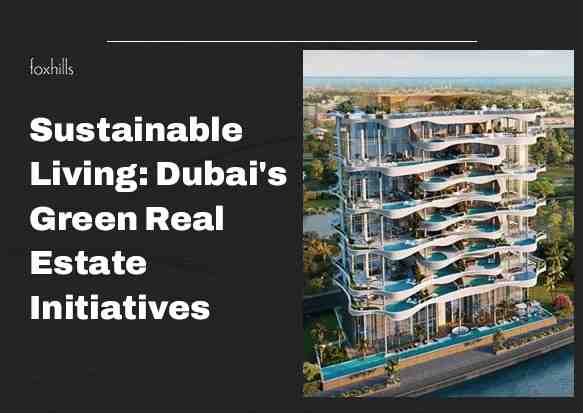Sustainable Living: Dubai's Green Real Estate Initiatives | Foxhills

In recent years, green real estate projects in Dubai have put the city at the forefront of the movement toward sustainable living. The city's leaders are aware of the need to protect natural resources and adopt environmentally sound policies as they plan for the future. Fouad Al Masri, the founder of Foxhills, believes there has never been a better moment to create green real estate, even though some in the real estate business think sustainable development is too expensive to be practical. Here we will explain how builders and developers are making it possible.
How Developers are Taking Dubai's Green Real Estate Initiatives
The built environment offers many opportunities for implementing solutions that conserve energy, reduce waste, and enhance the quality of life in long-term sustainable and economically advantageous ways for all parties involved.
LEED-Certified Structures
The increasing number of Leadership in Energy and Environmental Design (LEED) certified buildings in Dubai indicates the city's dedication to sustainable development. Energy efficiency, water conservation, and the use of non-toxic materials are all top priorities in the planning and making of these buildings. LEED accreditation has become a standard for environmentally friendly building methods in Dubai, used for anything from residential high-rises to commercial buildings.
Solar Power Integration
The bright weather in Dubai is perfect for solar power generation. More and more buildings in the city are installing solar panels to generate their energy, demonstrating the city's commitment to solar power integration in the built environment. This project helps reduce carbon emissions by decreasing dependency on conventional energy sources.
Water Conservation Measures
Dubai has taken many steps to save water in response to the global water shortage problem. Builders use cutting-edge water conservation measures to reduce water waste, including smart irrigation systems, low-flow plumbing fixtures, and greywater recycling infrastructure. These measures not only aid in preserving this invaluable resource but also assist lower utility bills for locals.
Eco-Friendly Architecture and Outdoor Areas
Dubai's green real estate projects are not limited to physical structures. Green areas and environmentally friendly architecture are prioritized throughout the city. To encourage biodiversity and provide city dwellers a respite from the hustle and bustle, parks, gardens, and recreational places must be created. Green construction plans emphasize natural ventilation and include eco-friendly materials to lessen their environmental impact further.
Public Transportation and Walkability
Dubai's real estate projects prioritize improving public transit and walkability to encourage eco-friendly lifestyles. Residents are encouraged to use less of their own automobiles and more environmentally friendly means of transportation through well-connected metro and tram networks as well as pedestrian-friendly infrastructure. This holistic strategy helps make the city more hospitable and sustainable by decreasing traffic and pollution.
Conclusion
Its green real estate programs show Dubai's dedication to sustainable living. The city is working toward a more sustainable and hospitable future with the help of LEED-certified buildings, solar power integration, water conservation measures, green areas, and enhanced public transit. Dubai's dedication to sustainability is an example that other cities throughout the globe may learn from as they work toward a better, more legitimate future.
